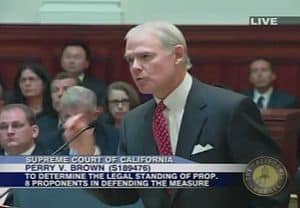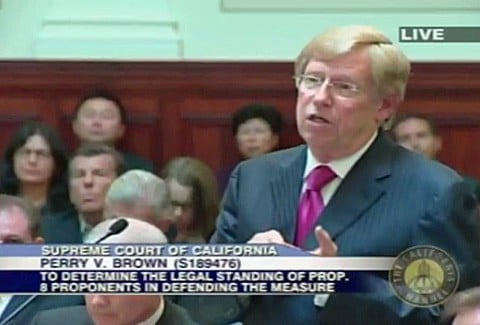Today, the California Supreme Court heard arguments at the behest of the Ninth Circuit, which certified a question to California's highest court on the issue of standing: As a matter of state law, do initiative proponents, like the ironically named 'Protect Marriage', have the power to defend the enacted initiative in federal court when the State declines? Ted Olson represented the American Foundation for Equal Rights (AFER) in support of same-sex marriage rights and answered the question, NO. Charles Cooper, representing the anti-gay 'Protect Marriage', the party seeking standing, answered the question, YES.
 The at-times testy hearing saw tough questioning from the bench of both attorneys. Even the supposedly "liberal" justices went after Mr. Olson and had particular difficulty with his views on the scope of the initiative power. Mr. Cooper seems to have fared worse: all but one justice asked questions deeply skeptical of his broad standing argument. Then again, how judges ask their questions often has little to do with their ultimate decision.
The at-times testy hearing saw tough questioning from the bench of both attorneys. Even the supposedly "liberal" justices went after Mr. Olson and had particular difficulty with his views on the scope of the initiative power. Mr. Cooper seems to have fared worse: all but one justice asked questions deeply skeptical of his broad standing argument. Then again, how judges ask their questions often has little to do with their ultimate decision.
There are two take-aways from today's hearing:
First, this stage of the Prop 8 federal litigation is not about gays, equal protection or even marriage. The only issue before the California Supreme Court is whether under state law, initiative proponents have the power to defend the initiative they proposed when the arms of the State — the governor and attorney general — decline to defend it. Therefore, today's argument was about the scope of the initiative power, the state's intervention policies and how best to protect both.
Second, nothing that happened today changes my view that while certifying the question was not an exercise in futility, regardless of the court's decision, standing as a matter of federal law will still have to be determined by the Ninth Circuit. And, on that issue, 'Protect Marriage' will lose.
AFTER THE JUMP is a more in-depth discussion of some of the legal arguments in this hearing. I have organized it thematically rather than chronologically. After the discussion, I make some tentative predictions and discuss what comes next. I encourage you to ask any questions in the comments. Various gay rights organizations, including AFER and the National Center for Lesbian Rights, live-tweeted the hearing. So, if you missed the streaming video, I encourage you to either check out the Twitter feeds or watch the archived tape, which Andy will make available once it appears online. (update from Andy – no embed yet, but you can re-watch HERE)
CONTINUED, AFTER THE JUMP…
Where is the "particularized interest"?
In order for anyone — a person, a state — to intervene in a litigation, he or she has to have a "particularized interest" in the litigation. This is different from federal standing requirements which require a "specific or particular harm" to have standing to appeal an adverse decision. Remember, at issue in this hearing before the California Supreme Court is what state law says about initiative proponents' right to step into the shoes of the state when the state declines to defend the enacted initiative in court, state or federal. That is a question of intervention, not standing.
Mr. Cooper argued that 'Protect Marriage' had sufficient interest – it spent millions of dollars, proposed the initiative, put in the manpower, was responsible for the political campaign and, most importantly, has an institutional interest in protecting its "fundamental right to propose initiatives."
The first problem with that argument is that we're a little late. An interest in preserving a right to propose and enact an initiative arises when some third party is trying to stop you from proposing or enacting your initiative. Prop 8 has already been proposed and enacted, so the interest in protecting the right to propose and enact is unaffected.
What is the extent of California's initiative power?
Mr. Cooper says that the interest is institutional, systemic and long term. That is, if you deny a right to defend Prop 8, the right to propose and enact future initiatives will be infringed. Let us assume for the moment that he has a point. There is still another problem with his argument.
Perry v. Brown, the appeal in question, does not seek to touch initiative proponents' right to propose and enact initiatives or referenda. It is challenging the constitutionality of a duly enacted initiative. The California initiative statute confers on citizens the right to "propose and enact" laws through the initiative process; the California Supreme Court has gone so far as to call that right fundamental. Never has a statute or a court said that a right to defend the already enacted initiative is part of that right to "propose and enact." As Mr. Olson noted, that is why previous initiative proponents placed clauses in their initiative that granted them standing if the state declined to defend the law in court. And, that makes sense. A legislature normally has the power to propose and enact laws, but, absent a specific statute giving a legislature power to defend duly enacted laws when the executive branch declines, neither a random legislator nor the speaker of the lower house has the power to defend the laws in court.
Some members of the court asked Mr. Olson if, by giving the governor and attorney general sole control over the defense of state laws, he is making the initiative right illusory. That is, what is a right to propose and enact if you can never defend? Mr. Olson had a simple response: that's not really my problem. The California Constitution and California's initiative statute says nothing about a power to defend an already enacted initiative and no California court has ever recognized that such a power is subsumed under the "propose and enact" power. In fact, the court has implied the opposite when it said that the initiative power is coextensive with the legislative power, no more and no less. Absent specific statutory authorization, a legislature does not have the power to defend laws in court. That is the job of the executive, and the principle of separation of powers demands that those responsibilities be kept separate.
If the state thinks that "propose and enact" should include "defend," then that is a matter for legislation or constitutional amendment. It is not to be read into the current law by the court.
Does this issue begin and end with Karcher? If not, what is different about Karcher?
Karcher v. May is a New Jersey case about third parties stepping into the shoes of a state who refused to defend a law. Beyond that general skeletal similarity, Karcher bears little resemblance to this case. In Karcher, the New Jersey legislature passed a 'moment of silence' statute that the governor refused to defend in court, so the President of the New Jersey Senate and the Speaker of the New Jersey House sought to intervene to defend their law. Pursuant to a state law that explicitly granted legislative leaders the power to defend duly enacted state laws, they were granted intervention.
But, you can see the difference. First, the legislature passed the underlying statute at issue; here, citizens proposed and enacted a law via the initiative process. Second, the intervenors were duly enacted representatives of the people whose constitutional duty was to propose and enact laws; here, the proponents of Prop 8 are simple California citizens. Third, and most importantly, New Jersey law explicitly granted legislative leaders the right to step into the shoes of the state. Given these differences, I cannot see how Mr. Cooper can win on his argument that Karcher controls and gives standing to his clients.
How will the California Supreme Court rule?
Two justices kept returning to the question of how to rule. They asked both attorneys if it would be sufficient for the court to hold that, as a matter of state law, California has always had a policy of liberal intervention. Period. That would tell the Ninth Circuit that while state law may be somewhat unclear and unspecific about the rights of initiative proponents, California's tradition of allowing interested parties to intervene should govern. That is, if it were up to California law — if Perry were in state court — the initiative proponents would be allowed to intervene and take the case as far as it could go. Both Mr. Cooper and Mr. Olson said this answer would be enough.
But, that is in state court. As we have discussed, the power to represent the state persuant to state law may be a necessary prerequisite of federal standing, but it is woefully insufficient. For federal standing, you have to show a clear and specific harm caused by an adverse ruling. That requirement, over and above California's intervention rules whatever they may be, will likely doom 'Protect Marriage'.
What happens next?
Next, we wait. We wait for a decision from the California Supreme Court, which should take under 90 days. At that point, the decision will go back to the Ninth Circuit, which will take it under advisement for its decision. It is possible that the Ninth Circuit will order a rehearing given what it learned, but if the California court simply reiterates its liberal intervention norms, there will be no need for a rehearing. Standing should be denied for failure to show specific harm caused by the overturning of Prop 8 below. It is hard to say how long the Ninth Circuit will take to render that decision, but assuming we do not hear from the California Supreme Court before December, the Ninth Circuit panel may rule in March 2012.
***
Ari Ezra Waldman is a 2002 graduate of Harvard College and a 2005 graduate of Harvard Law School. After practicing in New York for five years and clerking at a federal appellate court in Washington, D.C., Ari is now on the faculty at California Western School of Law in San Diego, California. His research focuses on gay rights and the First Amendment. Ari will be writing weekly posts on law and various LGBT issues.
Follow Ari on Twitter at @ariezrawaldman.




